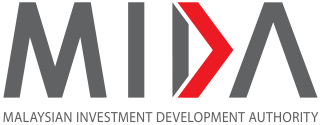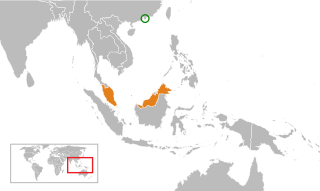Related Research Articles

A foreign direct investment (FDI) refers to purchase of an asset in another country, such that it gives direct control to the purchaser over the asset. In other words, it is an investment in the form of a controlling ownership in a business, in real estate or in productive assets such as factories in one country by an entity based in another country. It is thus distinguished from a foreign portfolio investment or foreign indirect investment by a notion of direct control.

The Malaysian Investment Development Authority, abbreviated MIDA, previously known as Malaysian Industrial Development Authority is the government's principal agency to oversee and drive investment into the manufacturing and services sectors in Malaysia. Starting operations in 1967, MIDA was given the mandate to promote investments in the manufacturing and services sectors; and to advise the Ministry of International Trade and Industry (MITI) on industry matters including the formulation of related policies.

Foreign direct investment in Iran (FDI) has been hindered by unfavorable or complex operating requirements and by international sanctions, although in the early 2000s the Iranian government liberalized investment regulations. Iran ranks 62nd in the World Economic Forum's 2011 analysis of the global competitiveness of 142 countries. In 2010, Iran ranked sixth globally in attracting foreign investments.

UK Trade & Investment (UKTI) was a UK Government department working with businesses based in the United Kingdom to assist their success in international markets, and with overseas investors looking to the UK as an investment destination. It was replaced in July 2016 by the Department for International Trade.

SARIO, Slovak Investment and Trade Development Agency is a government agency established in the Slovak Republic in 2001, which works under the direction of the Ministry of Economy of the Slovak Republic.
An investment promotion agency (IPA) is most often a government agency whose mission is to attract investment to a country, state, region or city. They do this through the use of marketing activities by creating awareness about a location as an attractive destination for investment Generally, IPAs have four core functions: image building of FDI hosting country, investment generation, project management and aftercare services. While IPAs play an important role in attracting investment to developed countries some IPAs have additional advocacy function.

In 2012, Romania's largest trading partner was Germany, followed by Italy. Romania's main exports to Germany were insulated wire, cars and vehicle parts, whereas its main German imports are cars and vehicle parts. The principal Italian imports to Romania include hides, footwear parts, medicaments, telephones and vehicle parts. Romania's chief exports to Italy included leather footwear, cars, telephones, tobacco, men's suits, seats and iron pipes.

Established in 1993, the Investment and Development Agency of Latvia (LIAA) acts under the Ministry of Economics of the Republic of Latvia.
Board of Investment (BOI) (Urdu: ہیئتِ پاکستان برائے سرمایہ کاری) is the premier investment promotion agency of Pakistan working under the administrative control of the Prime Minister’s Office and is mandated to promote and facilitate both local & foreign investment. The Board of Investment is a member of the World Association of Investment Promotion Agencies (WAIPA).

Invest KOREA (IK), Korea's national investment promotion agency, was established as part of the Korea Trade-Investment Promotion Agency (KOTRA) to promote foreign direct investment(FDI) to Korea. It provides comprehensive services for all investment stages of Korea, including investment feasibility study, investment execution(establishment of foreign invested company, investment declaration, legal consultation, etc.), and grievance resolution.
The Department for Promotion of Industry and Internal Trade (DPIIT) is a central government department under the Ministry of Commerce and Industry in India. It is responsible for formulation and implementation of promotional and developmental measures for growth of the industrial sector, keeping in view the national priorities and socio-economic objectives. While individual administrative ministries look after the production, distribution, development and planning aspects of specific industries allocated to them, DPIIT is responsible for the overall industrial policy. It is also responsible for facilitating and increasing the foreign direct investment (FDI) flows to the country.
Jordan Investment Commission (JIC), previously Jordan Investment Board, is the national investment promotion agency of the Hashemite Kingdom of Jordan.
The Vanuatu Foreign Investment Promotion Agency (VFIPA), is Vanuatu's National investment promotion agency. It was established by the foreign investment act [cap 248] in 1998 and operating as a unit under the department of Trades and Industry with a mandate to "promote and facilitate foreign investments into Vanuatu.
Thai Khem Khaeng was a Thai economic stimulus investment program imposed by the government of Abhisit Vejjajiva in the years 2009 and 2010, led by Finance Minister Korn Chatikavanij. The program consist of two major stimulus packages injected in the Thai economy involving vast investments in industry, science, technology, agriculture, logistics and infrastructure, environment, education, labour and tourism and the positive impact remains in the economy up to the present.

Hong Kong–Malaysia relations refers to bilateral diplomatic relations between Hong Kong and Malaysia.
A foreign direct investment (FDI) is an investment in the form of a controlling ownership in a business in one country by an entity based in another country. It is thus distinguished from a foreign portfolio investment by a notion of direct control. Broadly, foreign direct investment includes "mergers and acquisitions, building new facilities, reinvesting profits earned from overseas operations, and intra company loans". FDI is the sum of equity capital, long-term capital, and short-term capital as shown in the balance of payments. FDI usually involves participation in management, joint-venture, transfer of technology and expertise. Stock of FDI is the net cumulative FDI for any given period. Direct investment excludes investment through purchase of shares.

As of 2019, the automotive industry in Thailand is the largest in Southeast Asia and the 10th largest in the world. The Thai industry has an annual output of more than two million vehicles, more than countries such as Belgium, Canada, the United Kingdom, Italy, Czech Republic and Turkey.

The Bangladesh Investment Development Authority (BIDA) is the apex investment promotion agency (IPA) of Bangladesh. BIDA promotes and facilitates private investment and advocates business-friendly policies. BIDA provides regulatory services including registration, approvals and recommendations. BIDA is supervised by the Prime Minister's Office. The head office of BIDA is located in Dhaka and its divisional offices are in Chattogram, Rajshahi, Khulna, Sylhet and Barishal.
Investment incentive is a government-implemented incentive policy aimed to encourage investors into its domestic market or to promote expansion of existing businesses. Investment incentives encompass creating an environment that enables foreign businesses to operate profitably and decreases risks. They are widely used by developing countries to attract investments. The incentives take form of "direct subsidies or corporate income tax credits that compensates the investors for their capital costs".
References
- ↑ "Incentives". Thailand Board of Investment (BOI). Retrieved 13 January 2017.
- ↑ "Thailand takes steps to boost FDI". Oxford Business Group. 2016-07-19. Retrieved 13 January 2017.
- ↑ "What We Do". Thailand Board of Investment (BOI). Retrieved 13 January 2017.
- ↑ "Organization Chart". Thailand Board of Investment (BOI). Retrieved 13 January 2017.
- ↑ "Foreign direct investment (FDI) collapses: Biggest dip in decade". Bangkok Post. 2 August 2016. Retrieved 13 January 2017.
- ↑ Summary Report: 2015 Foreign Investor Confidence Survey (PDF). Bangkok: Bolliger & Company (Thailand) Ltd. September 2015. Retrieved 13 January 2017.